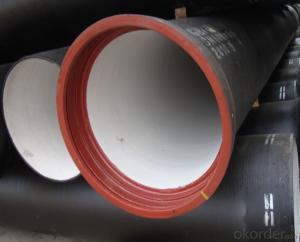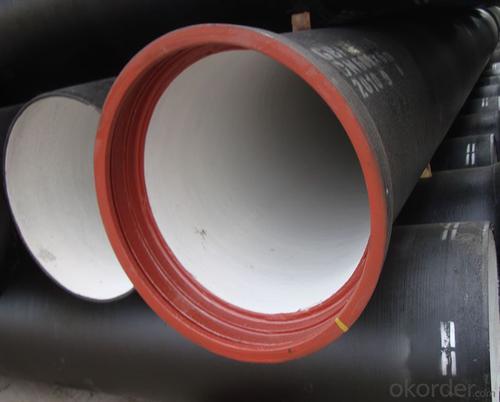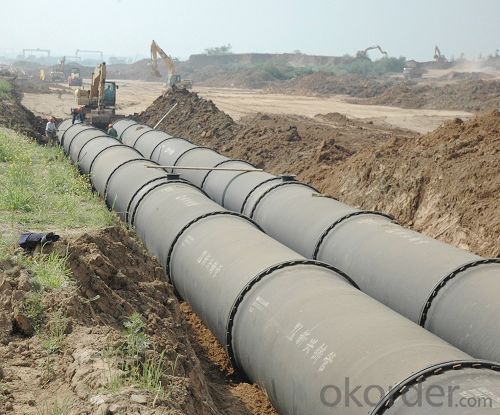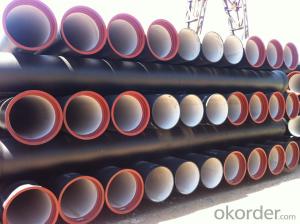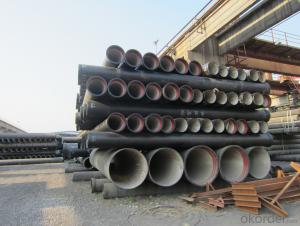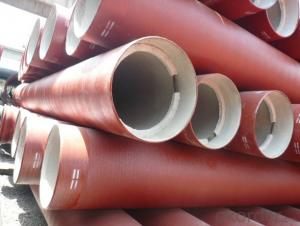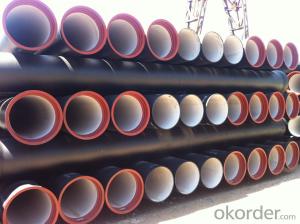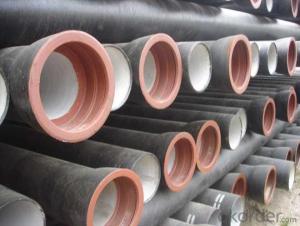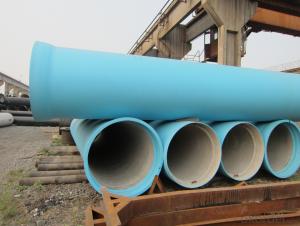Ductile Iron Pipe of China C30 DN200-DN1000 EN545/EN598 for Water Supply
- Loading Port:
- China main port
- Payment Terms:
- TT or LC
- Min Order Qty:
- 20 m.t.
- Supply Capability:
- 100000 m.t./month
OKorder Service Pledge
OKorder Financial Service
You Might Also Like
1,Ductile Iron Pipe Description :
Pipes confirm to ISO2531,K9 class,T type joint,6m long,with inside cements lining conform to ISO4179, outside Zinc spraying(130g/m2) and bitumen coating(70μm) conform to ISO8179.
Our products have been sold to many international market,such as Middle East and South East Asia and Africa.
DI pipe fittings are manufactured according to ISO 2531 or BS EN545 or BS4772 FOR POTABLE WATER ,internal is cement lining or wet epoxy coating;External is zinc plus bitumen or wet epoxy coating. We also manufacture ductile iron fittings with fusion bonded epoxy both inside and outside. All the producets are sutible to water pipes fields.
2,Main Features of the Ductile Iron Pipe:
. Material: Ductile iron grade 500-7/ 450-10 in accordance with ISO1083
. Standard: ISO 2531, EN545, EN598, ANSI, AWWA
. Certificate: ISO9001, ISO14001, SGS, NSF, WRAS
. Test: In accordance with ISO 2531 / EN 545 / EN598 and 100% water pressure test
. Length: 6m or cut into 5.6m, 5.7m, 5.8m
. Internal Lining: Cement, conform to ISO4179
. External coating: Zinc + Bitumen, conform to ISO8179
. Rubber: NBR, SBR, EPDM according to ISO4633 / EN681.1
. Note: The gaskets, bolts & nuts are supplied respectively as your special requirement
3,Ductile Iron Pipe Images:
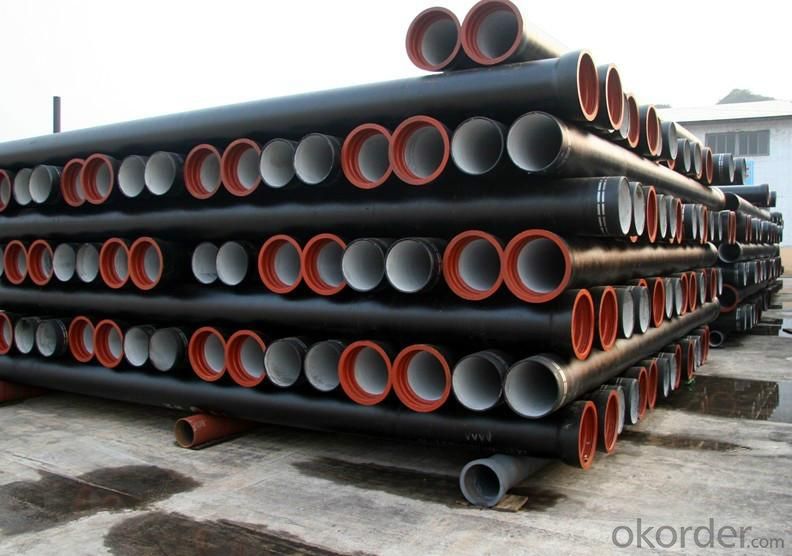
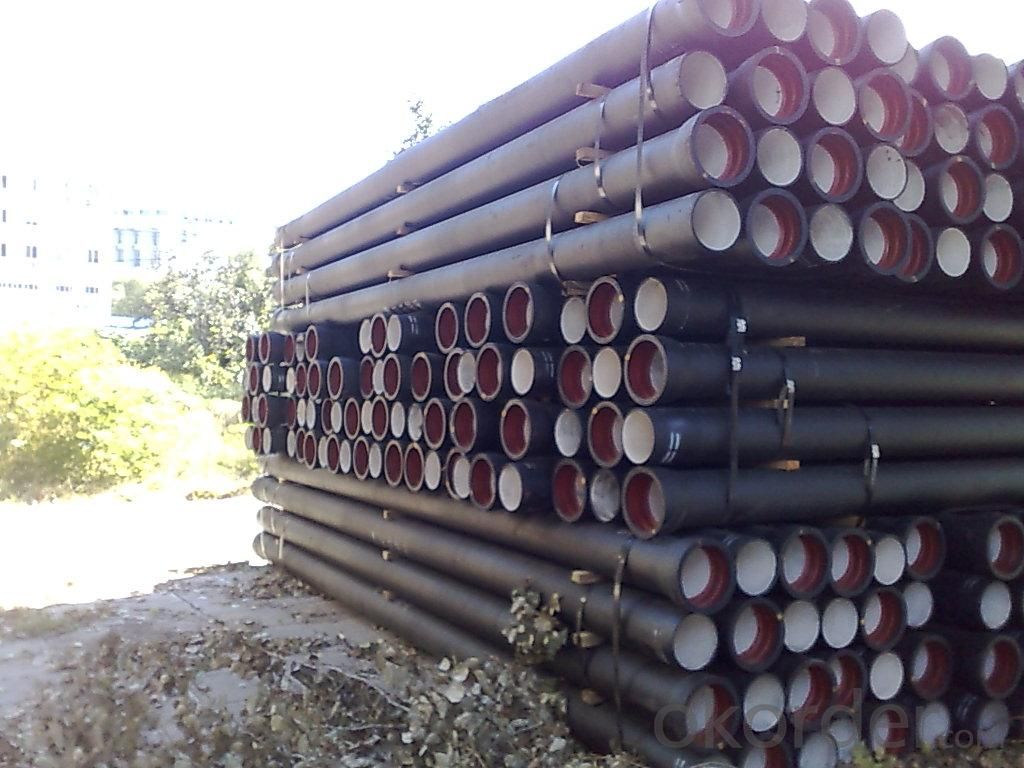
4. Ductile Iron Pipe Specification
Surface Finishes:Bare, Oiled, Mill Varnish, Galv,FBE, FBE Dual, 3LPE, 3LPP, Coal Tar,Concrete Coating and Tape Wrap
End Finishes: Beveled, Square Cut, Threaded, hat
Additional Services: Internal Coating
Packaging: packed in bag, plastic bag, steel strip, steel wire,double wire, iron box, wooden box,
tarpaulin, plastic sheeting
Inspection: MOODY SGS BV GL DNV ABS LIOYD’S
Test :X-ray, UT, magnetic particle,inspection,hydrostatic test.
Processing service :Beveling, Threading, Slotting, Cut-to length, Bends, Quench and Temper, Fabrication, Double-jointing and On-site assistance
Documentary MTC: material certification,Origin certification, CI or PI,Test Report, export licence, handling order, B/L,insurance policy,shipping instructions, contract, packing list etc.
Internal lining: ductile iron pipes shall have an internal cement mortar lining in acc with ISO4179.
External coating: ductile iron pipes shall be externally coated with metallic zinc spray plus a further layer of resin painting to ISO8179.
Gasket: 100% SBR/NBR/EPDM rubber gasket in accordance with ISO4633.
Payment term: L/C, T/T.
5.FAQ:
We have organized several common questions for our clients,may help you sincerely:
1.Q: Why would you choose ductile iron pipe rather than other pipe materials?
A:The reasons are obvious for that not only ductile iron pipe possesses the inherent strength and flexibility of ductile iron, combined with proven corrosion protection systems, but also the cost savings can be achieved from design to installation and commissioning.
2.Q:Why can you guarantee the inner of pipes can’t be corroded?
A: High alumina cement mortar lining and sulphate-resistant cement mortar lining. These two special linings are applicable to inner anti-corrosion for sewage pipes, improving resistance to erosion of the sewage components.
- Q: Can ductile iron pipes be used for underground fuel storage systems?
- No, ductile iron pipes are not suitable for underground fuel storage systems. They are more commonly used for water and sewer applications due to their strength and durability in carrying liquids. Underground fuel storage systems require materials that are specifically designed to handle the corrosive nature of fuel and prevent leaks or contamination, such as double-walled fiberglass or steel tanks.
- Q: The role of chromium in nodular cast iron
- In order to further understand the mechanism of chromium in ductile iron, the application of electronic scanning and other test means, from chrome crystal structure, crystallization, solidification, heat treatment transformation principle, further study on the mechanism of chromium in ductile iron.
- Q: Can ductile iron pipes be used for both water and wastewater applications?
- Ductile iron pipes are versatile and can be utilized in both water and wastewater settings. Their durability, strength, and corrosion resistance make them appropriate for various purposes such as water distribution, sewage systems, and wastewater treatment plants. These pipes are specifically engineered to endure high pressure and effectively manage the flow of both water and wastewater. Furthermore, ductile iron pipes possess a lengthy lifespan, minimizing the necessity for frequent replacements and maintenance. This attribute renders them a cost-effective alternative for both water and wastewater applications.
- Q: How do ductile iron pipes perform in seismic zones?
- Ductile iron pipes have proven to perform exceptionally well in seismic zones due to their unique characteristics and design features. These pipes are known for their ability to withstand ground movements, vibrations, and other seismic forces that may occur during an earthquake. The inherent flexibility of ductile iron pipes allows them to absorb and distribute the energy generated by seismic activities. This flexibility helps prevent the pipes from fracturing or breaking under intense ground shaking. Additionally, the high strength and resilience of ductile iron make it highly resistant to damage caused by ground movements. Furthermore, ductile iron pipes are designed with restrained joints, which provide added stability and resistance to seismic forces. These joints can accommodate small lateral movements without compromising the integrity of the pipeline system. The restrained joints also prevent the pipes from becoming disconnected or misaligned during seismic events, ensuring the continuous flow of water or other fluids. In seismic zones, where the ground is more prone to liquefaction or soil settlement, ductile iron pipes are often installed using methods that enhance their stability. For instance, the use of deep embedment techniques or the incorporation of thrust blocks at bends and fittings increases the resistance of the pipes to the lateral forces exerted by the ground. The performance of ductile iron pipes in seismic zones is further enhanced by regular inspection and maintenance. Periodic assessments can detect any potential weaknesses or damages that may have occurred during seismic events, allowing for timely repairs or replacements to be made. Overall, ductile iron pipes have a proven track record of reliable performance in seismic zones. Their flexibility, strength, and design characteristics make them highly resilient to seismic forces, ensuring the safe and uninterrupted supply of water or other fluids even in areas prone to earthquakes.
- Q: Will the cast iron pipes rust?
- Ductile iron pipe corrosion process is good, decided whether it will rust. Whether it will rust or not, the key is whether the anti-corrosion process of the nodular cast iron pipe is in place.
- Q: What do ductile iron pipes need to connect with three? Can I contact it directly?
- Because the interface material used in the old process is poisonous, especially in the water supply pipeline, environmental protection requires a new process now
- Q: How to analyze and judge the quality of ductile iron pipe
- The quality of water supply pipe ductile is a topic worthy of discussion, how to judge the quality of the ductile iron pipe, ductile now on the market is all kinds of pipe, a name sand type ductile iron pipe, ductile water-cooling tube, K8 grade K9 grade ductile iron pipe, ductile iron pipe, also the brand is divided into ductile ductile pipe pipe, big brands, and some well-known manufacturers of producing ductile pipe,
- Q: Are ductile iron pipes suitable for sewage treatment plants?
- Yes, ductile iron pipes are suitable for sewage treatment plants. Ductile iron pipes are known for their durability, strength, and corrosion resistance, making them ideal for handling the corrosive and abrasive nature of sewage. They can withstand high pressure and are capable of accommodating heavy loads and ground movements, making them a reliable choice for sewage treatment facilities. Additionally, their smooth interior surface minimizes friction, reducing the risk of clogs and improving the flow of wastewater.
- Q: What is the difference between cast iron pipe and seamless steel pipe and galvanized steel pipe?
- Cast iron pipe: cast pipe made of cast iron. Cast iron pipes are used for water supply, drainage and gas transmission lines. They include cast iron pipes and pipe fittings. Labor intensity is small. According to the casting method, it is divided into continuous cast iron pipe and centrifugal cast iron pipe, in which the centrifugal cast iron pipe is divided into sand mould and metal type two kinds. Divided into gray cast iron pipe and nodular cast iron pipe according to different material. According to the interface form, it is divided into flexible interface, flange interface, self anchored interface, rigid interface and so on. Among them, the flexible iron pipes rubber sealing ring; flange interface cast iron pipe flange fixed in the rubber pad, the flange gasket sealing; rigid interface cast iron pipe socket is large, straight pipe is inserted, sealed with cement, this technology has been basically eliminated.
- Q: What is the expected leakage rate of ductile iron pipes?
- The expected leakage rate of ductile iron pipes can vary depending on various factors such as the age and condition of the pipes, the quality of installation, and the presence of any external factors that may impact the integrity of the pipes. However, in general, ductile iron pipes are known for their durability and low leakage rates compared to other types of pipes. According to industry standards and studies, the expected leakage rate of well-maintained and properly installed ductile iron pipes is typically less than 0.5 liters per pipe per day (LPPD). This leakage rate is considered acceptable and meets the requirements set by various regulatory bodies and organizations. It is important to note that regular maintenance and inspections are crucial in maintaining the low leakage rate of ductile iron pipes. By identifying and repairing any potential leaks or damages promptly, the overall leakage rate can be effectively minimized. Furthermore, advancements in manufacturing techniques and improvements in pipe design have led to the development of more leak-resistant ductile iron pipes. These pipes may have even lower expected leakage rates than the industry average, further enhancing their overall performance and reliability. Ultimately, while the expected leakage rate of ductile iron pipes can vary, it is generally considered to be low when properly installed and maintained, making them a reliable choice for various water distribution and transmission systems.
Send your message to us
Ductile Iron Pipe of China C30 DN200-DN1000 EN545/EN598 for Water Supply
- Loading Port:
- China main port
- Payment Terms:
- TT or LC
- Min Order Qty:
- 20 m.t.
- Supply Capability:
- 100000 m.t./month
OKorder Service Pledge
OKorder Financial Service
Similar products
Hot products
Hot Searches
Related keywords
